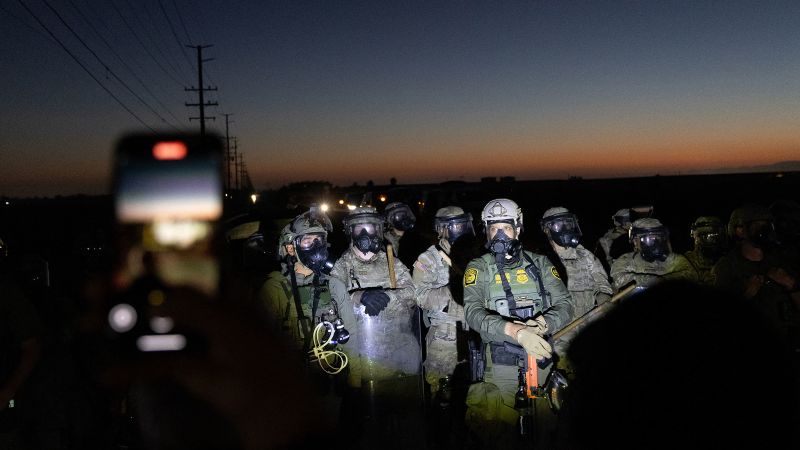CNN
—
A federal judge on Friday found that the Department of Homeland Security has been making stops and arrests in Los Angeles immigration raids without probable cause and ordered the department to stop detaining individuals based solely on race, spoken language or occupation.
US District Judge Maame Ewusi-Mensah Frimpong, an appointee of former President Joe Biden, ordered that DHS must develop guidance for officers to determine “reasonable suspicion” outside of the apparent race or ethnicity of a person, the language they speak or their accent, “presence at a particular location” such as a bus stop or “the type of work one does.”
Friday’s ruling comes after the ACLU of Southern California brought a case against the Trump administration last week on behalf of five people and immigration advocacy groups, alleging that DHS — which oversees Immigration and Customs Enforcement — has made unconstitutional arrests and prevented detainees’ access to attorneys.
The ruling is limited to the seven-county jurisdiction of the US Central District of California, which includes Los Angeles and surrounding areas.
Frimpong said in her ruling that the court needed to decide whether the plaintiffs could prove that the Trump administration “is indeed conducting roving patrols without reasonable suspicion and denying access to lawyers.”
“This Court decides—based on all the evidence presented—that they are,” Frimpong wrote.
Frimpong went on to say that the administration “failed” to provide information about the basis on which they made the arrests. The temporary restraining order also applies to the FBI and the Justice Department, which were also listed as defendants in the lawsuit and have been involved in immigration enforcement.
In Friday’s ruling, Frimpong also ordered DHS to maintain and provide regular documentation of arrests to plaintiffs’ counsel.

In a hearing Thursday before she ruled, Frimpong appeared skeptical of the government’s arguments. The government said in court that DHS agents initiate stops based on intelligence or “trend analysis,” not on race or ethnicity. Frimpong repeatedly pressed the government to provide evidence that arrests were based on actionable intelligence rather than targeting areas where undocumented immigrants are presumed to gather.
“It’s hard for the court to believe you couldn’t find one case with a report of why someone was targeted,” she said Thursday.
In a separate temporary restraining order, Frimpong blocked DHS from denying the detainees’ access to counsel, including visits and calls, in a holding facility referred to as “B-18” in court documents.
Immigration advocacy groups had raised concerns that detainees in B-18 weren’t afforded the opportunity to contact a lawyer. They also claimed that the detainees were held in inhumane conditions, such as not having access to beds, showers or medical facilities.
DHS spokesperson Tricia McLaughlin condemned the ruling in a statement, saying, “A district judge is undermining the will of the American people.”
Since returning to the White House, President Donald Trump has moved aggressively to crack down on immigration.
Last month, the Trump administration called for ICE to expand deportation efforts in Democratic cities and “do all in their power” to achieve mass deportations. Trump also ordered the deployment of thousands of National Guard troops to Los Angeles last month in response to protests against his administration’s immigration raids. The administration previously sued the city of Los Angeles over its so-called “sanctuary city” policy.
California Gov. Gavin Newsom, a Democrat, celebrated Friday’s ruling in a post on X, saying, “California stands with the law and the Constitution — and I call on the Trump Administration to do the same.” Similarly, Los Angeles Mayor Karen Bass hailed the ruling as “an important step toward restoring safety, security and defending the rights of all Angelenos.”
Mohammad Tajsar, senior staff attorney for ACLU of Southern California, said in a statement, “No matter the color of their skin, what language they speak, or where they work, everyone is guaranteed constitutional rights to protect them from unlawful stops.”
This story has been updated with additional details.
CNN’s Hannah Rabinowitz and Josh Campbell contributed to this report.

